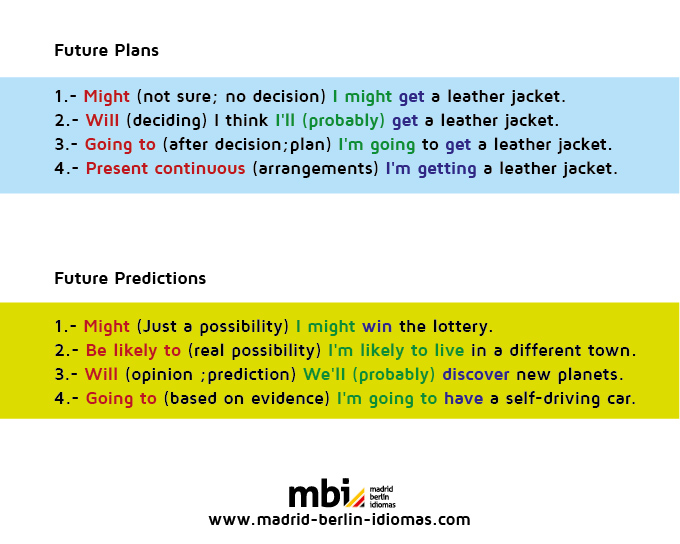Future with will, going to, present continuous, may might, futuro con presente simple.
1. Going to 2. Will 3. Present continuous 4. Might, may. 5. Presente simple
1. Going to se usa para hablar de intenciones y planes para el futuro que ya se tienen. Decisiones que ya se han tomado. No planes que acabamos de
I’m going to make chicken for dinner. (Ya he hecho la compra, tengo todos los ingredientes, etc. es lo que pensaba hacer para la cena,,,, no lo acabo de decidir)
She’s going to visit her grandmother tomorrow. (Me lo ha contado, pero yo no sé a qué hora, ni nada… si ya lo pudiera poner en la agenda… a las 7, en su casa… puedo usar un presente continuo)
¿Quedamos con Mary mañana a las 5 para tomar el te? Y tú contestas….
Sorry, she´s playing tennis with her mother at 5,30. Presente continuo como futuro, ya que tú sabes que tiene la pista de tenis alquilada… y había quedado ya con su madre.
I’m going to look for a job as soon as I finish university. Ese es mi plan. No pienso ni hacer un máster, ni tomarte un año sabático, ni….nada! me voy a poner a buscar trabajo.
Las tres frases hablan de un plan. (Fíjate también que es necesario usar una forma del verbo to be (am, is o are) antes.
De la misma manera, usamos going to + infinitivo para preguntar sobre planes para el futuro:
What are you going to do this weekend? ¿Qué piensas hacer este fin de semana? (qué intenciones tienes.)Pero si te pregunto si ya has quedado o qué planes fijos tienes, te pregunto ¿Tienes planes para este fin de semana? What are you doing at the weekend?
What film are you going to see at the cinema?
What are you going to buy at the supermarket?
Las negaciones en esta forma usan not going to + infinitivo para hablar de la intención de no hacer algo.
I’m not going to buy anything at the supermarket.
She’s not going to come to his birthday party.
They’re not going to listen to you.
2. Will
When to use WILL
We use WILL in the following circumstances:
Usamos will + infinitivo sin to
1. For things that we decide to do now. (Rapid Decisions)
This is when you make a decision at that moment, in a spontaneous way. Will, en cambio, se usa para hablar de decisiones espontáneas, que acabas de tomar:
The phone’s ringing. I’ll get it! (No habías planeado coger el teléfono, lo has decidido ahora, en cuanto ha empezado a sonar.)
[if !supportLists]• [endif]I think we’ll go right now. (I just decided this right now)
[if !supportLists]• [endif]Which one? Um, I will have the chicken sandwich please.
2. When we think or believe something about the future. (Prediction)
This can be based on personal judgement or opinion. Will para previsiones del futuro (cosas que pensamos que van a pasar pero que nos faltan datos). También pueden ser basadas en nuestra opinión o intuición
Do you think it will rain tomorrow?
Who do you think will win the football match? (Previsión de futuro con will.
I imagine I’ll see him later. He’ll probably be there.
Who do you think will win the football match?
I think the Boston Celtics will win the NBA finals.
[if !supportLists]• [endif]The President will not be re-elected at the next election. Me da a mí en la nariz, es mi impresión.
[if !supportLists]• [endif]I think it will rain later so take an umbrella with you. Si hubiera visto la previsión del tiempo, hay algo más de certeza, usaríamos going to rain.
Take an umbrella with you. It´s going to rain.
[if !supportLists]• [endif]I think you will find the movie interesting.
Notice how you often use “I think…” before the subject + will.
3. To make an offer, a promise or a threat. Te ofreces para hacer algo por otra persona, haces una promesa, o amenazas…
[if !supportLists]• [endif]You look tired. I’ll finish the dishes for you. (me ofrezco a hacer algo
[if !supportLists]• [endif]I will do my best to help you. Te ofrezco mi ayuda
[if !supportLists]• [endif]I will have it ready by tomorrow. Promesa… que sí que para mañana está hecho.
[if !supportLists]• [endif]Don’t worry, I won’t tell anyone. (won’t = will not) Prometo no irme de la lengua….
4. You use WON’T when someone refuses to do something. Para negarte a hacer algo.
Otros autores , lo ponen como una promesa en negativo y estaría en el apartado anterior… OK
[if !supportLists]• [endif]I told him to clean his room but he won’t do it.
Para hacer la negación, usamos won’t. Sirve también
I won’t speak to him after what he said last time.
5. Condicionales.
• If you say anything I will kill you! EndFragment
• I’ll drive you to work if you like.
If I go to the supermarket, I’ll buy some tuna.
What will you do if you fail your test?
If it rains, I won’t go out.
6. For a habit that is a predictable behaviour.
• My daughter will fall asleep as soon as she is put into bed.
• He will give up if he starts losing. He always does that.
She won’t like the idea of spending so much money on the repairs.
3. Presente continuo.
No hay mucha diferencia entre “going to” y el presente continuo cuando se habla de planes del futuro en inglés.
“I’m having lunch with Paul tomorrow.”
La pequeña diferencia es el presente continuo se usa para planes personales del tipo que podrías poner en el agenda: “mañana, 12:30, comida con Paul”. Así que normalmente son algo en el futuro cercano, porque son específicos – a un momento concreto del futuro.
Para algo más lejano, usaríamos going to. Y también usamos going to para planes e intenciones que no tienen una fecha y hora concreta todavía.
“I’m going to visit my grandfather next summer.”
“She’s going to get married in September.” (Me falta la fecha… no uso el presente contínuo…)
“I’m going to look for a job when I finish university.”
Entonces…
Las cosas que decimos en presente continuo son cosas que normalmente tienen un horario fijo, y podríamos apuntarlos en nuestra agenda. Ya hemos quedado con alguien, fecha hora, o hemos hecho todos los preparativos.
Es una definición un poco ambigua, pero es lo que pone en los libros de gramática.
“I’m meeting Charlie for a beer later.” (Tengo en mente una hora concreta.)
“She’s leaving tomorrow morning on the first train.” (El tren sale en un horario específico.)
“I’m having Tom and his wife over for dinner tomorrow.”
“I’m going to the doctor tomorrow.” ( Ya pedí cita y te puedo contar a qué hora y todo… no es un plan que haya que rematar)
Fíjate que going to en este último ejemplo habla más del desplazamiento, el movimiento para ir a ver el médico que del futuro. La expresión de going to también puede ser para ir a un sitio, claro.
Eso nos lleva otra vez a la pregunta original: ¿hay diferencia entre decir “I’m playing tennis tomorrow” y “I’m going to play tennis tomorrow”?
I’m playing tennis suena que tienes una hora específica en mente. Ya has hecho la reserva de la pista y todo.
4. Might, may
Para hablar de un futuro no decidido todavía, o para expresar incertidumbre, lo mejor es usar may or might.
La teoría dice que might conlleva menor probabilidad de que ocurra, pero en realidad es la entonación y el lenguaje corporal lo que determinan la diferencia.
En español usamos el subjuntivo.
Puede que la llame mañana
I might call her tomorrow.
Puede que llueva este fin de semana
It may rain this weekend.
5. Presente simple se usa sólo en caso de horarios.
Tren, bus….una reunión. Sobre todo de transporte público, actos sociales.
Cuidado porque en español suena estupendamente decir. Te llamo mañana….ya está explicado anteriormente. Esto no es un horario de trenes… no se pede decir… I call you tomorrow…. NOOOOO
Pero … sin embargo
My trains leaves on Thursday at 10am.
Mi tren sale el jueves a las 10 de la mañana.
The meeting is on Monday at 9.30am
La reunión es el lunes a las 9.30 de la mañana.
Future



